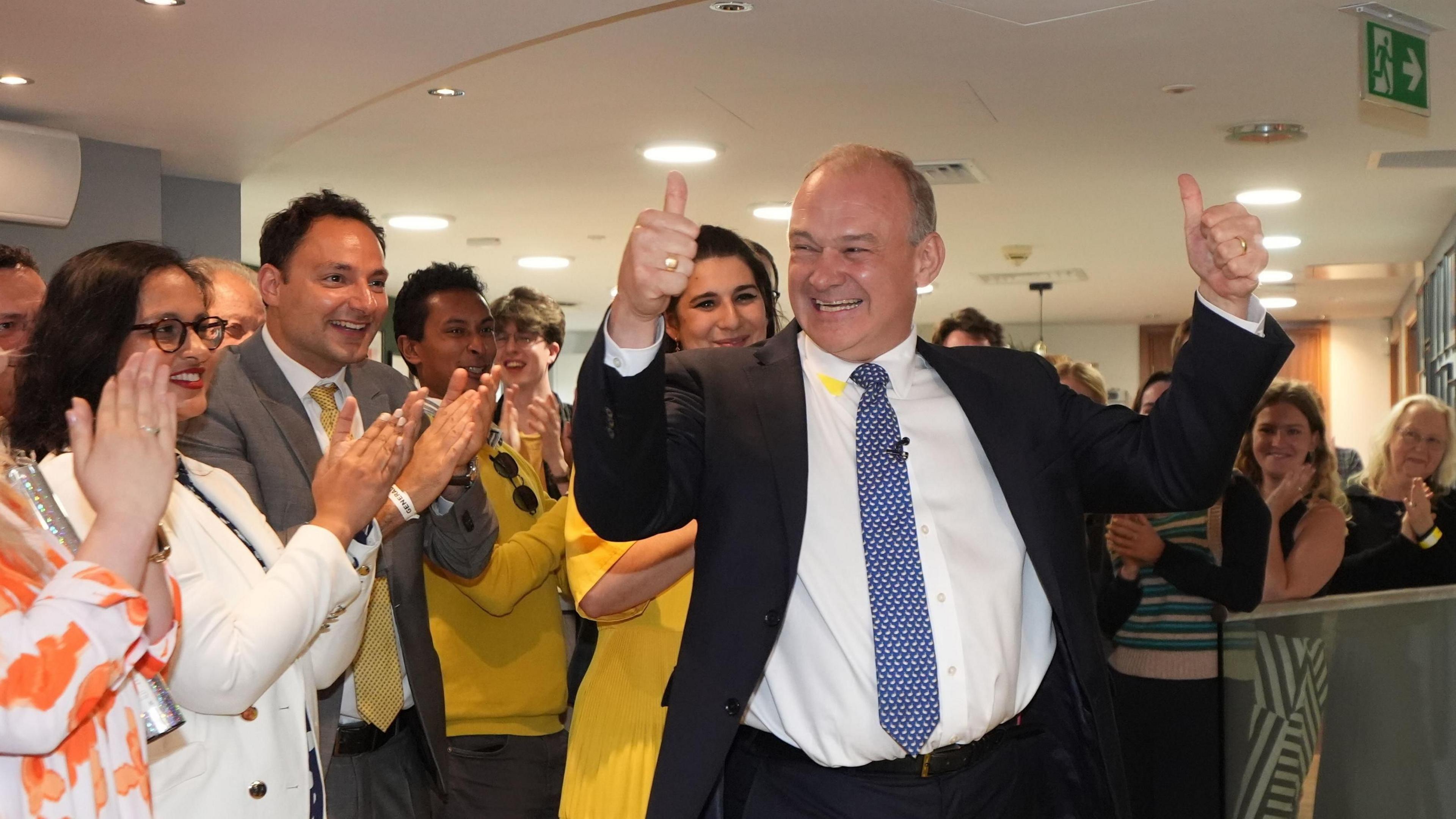Smiling Lib Dems plan to make the most of election success

Sir Ed Davey celebrated with supporters on election night as the party won a record number of MPs
- Published
Liberal Democrat smiles will be so broad in the next few days they will stretch from the end of Brighton Pier to the northern French coast.
The party is gathering for its autumn conference at the Sussex seaside and it seems reasonable to forecast an incoming tide of jubilance.
A party pulverised to smithereens after its years in coalition with the Conservatives is back and back big time - and they can’t quite believe it.
A few months back you could get all their MPs in a minibus.
Now - with 72 of them - you would need a double decker at least.
The 2024 general election was their best performance since the present day party was established in 1988.
And, more than that, it saw the highest number of seats won by a Liberal party for more than a century.
Speaking to some of the party’s senior figures, they are already talking about the next general election.
Their plan, as one put it to me, is to "finish the job".
By that they mean, if not quite wiping out the Conservatives, chipping away yet further at what had long seemed impermeable Tory territory primarily in southern England.
A splash of hubris, I wonder?
Maybe, but then again some Conservatives privately are already fretting about how hard it may prove to dislodge recently victorious Lib Dems.
The party has a reputation at Westminster for their capacity to dig themselves into constituencies and build strong local reputations.
And, come the next general election, unlike Labour, they won’t have a governing record to defend.
But let’s not get ahead of ourselves.
Steal our ideas, Lib Dem leader urges government
- Published7 July 2024
Stunts and substance saw Lib Dems win in Tory heartlands
- Published5 July 2024
Ed Davey hails record-breaking night for Lib Dems
- Published5 July 2024
For now, their new MPs are still finding their feet and their voice - as their leader Sir Ed Davey revels in his new-found prominence: a guaranteed spot at Prime Minister’s Questions every week and miles more media attention.
So what can we expect from this conference?
Plenty of celebration, yes, plus an attempt to cement a reputation as the party of hope.
The tone of politics is something Sir Ed has given considerable thought to, after his mix of wild capers, bungee jump included, and profound personal reflection - a party political broadcast that focused on the loss of his parents as a child and his disabled son - appeared to contribute to their election success.
The prime minister acknowledged to me the other day that what some see as his miserabilist tone, talk of things getting worse before they get better, “has been cast as doom and gloom, and I get that".
Combine this with the angry, noisy politics of recent years and Sir Ed hopes he can colonise a gap in the political market for those who want a more positive tone.
And what about policy?
Expect them to double down on the NHS and social care. They believe this brought clarity and dividends at the election.
The leadership has no desire to be a flotilla of small causes.
Speaking to some of their new MPs I do wonder how long some may be able to resist talking about Brexit.
Once unabashedly bashing of Brexit, the Lib Dems managed to pretty much avoid talking about it during the election.
How long might that last, particularly if sluggish economic growth persists allowing pro-Europeans to point to analysis – such as this from the Office for Budget Responsibility, external about the economic impact of the UK’s departure from the European Union?
What does Liberal Democrat success look like?
For me, this is the most intriguing question for the party.
What does it do in this parliament, how does it make an impact?
An avowedly anti-Conservative party now confronts a Labour government with an imperious majority.
How can or should it get noticed and effect change?
This is a big, open and not-immediately-obvious-to-answer conundrum.
Lib Dem leader Ed Davey arrives at conference by jet ski
But for now, for them, it is a nice conundrum to have, after a near decade of near irrelevance.
They will make the most of this moment and perhaps little wonder.
In the last 15 years, the four biggest parties in UK politics have all experienced the highest of highs and the lowest of lows.
Labour went from their biggest defeat since 1935 in 2019, to a stonking majority in July.
The Conservatives went from a huge win in 2019 to the worst in its parliamentary history.
The Scottish National Party had 56 MPs in 2015, every seat bar three in Scotland.
They now have nine.
And the Liberal Democrats went from coalition government in 2010, to near wipe out in 2015, to Himalayan political altitude now.
Who knows what is around the corner for any of them.
They all conclude it’s worth smiling when you can.